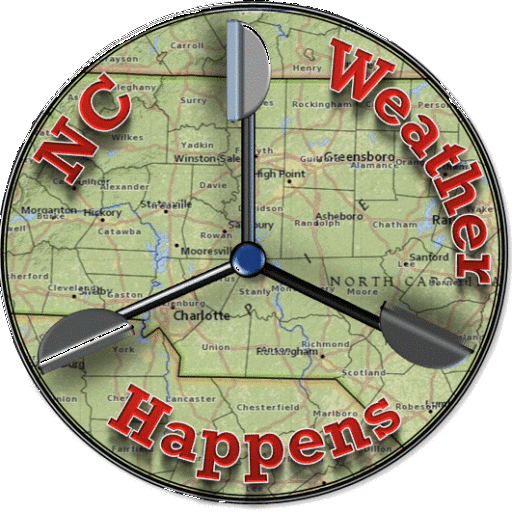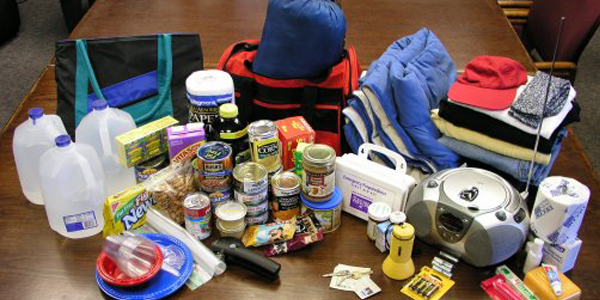Extended Power Loss a Possibility This Winter:
With North Carolina being highly susceptible to Ice Storms, we all know what it is like to lose power in the middle of winter for three or more days. In the storm of 2002, many in the Piedmont Triad area were without power for a week or more and at its peak, Duke Energy reported more than a million people without power! That is what 1 inch of ice will do!
While it is relatively nice now, and the harsh effects of winter are looming on the horizon, now is the time to make sure you and your family are prepared for extended power outage. This is also sage advice for any other natural disaster.
For the 2015/15 Winter weather forecast, click here.
Make a Kit
What things do I need to add to my kit?
- Pick up basic survival items. You should have enough supplies to survive without leaving your house for a few days, as well as tools to help you leave if necessary. Stock up on these necessities:
- Basic tools to keep handy: Hammer, pliers, screw driver, shovel, etc…
- Flashlights and batteries. Make sure you have good quality flashlights and lamps with fresh batteries. You can also buy self-powered flashlights and self-powered radios. Some models will also charge your cell phone.
- Candles. Keep some on hand but save your candles for the romantic times in your life and only use them as a last resort if all else fails. Keep a small supply of glow sticks in your kit. They are inexpensive, portable, won’t burn your house down, and last for hours.
- Non-perishable food. Stock up on canned soups and vegetables, powdered food, and grains like rice and pasta. Make sure you have enough to last your family at least three or four days. Most important: Make sure you have a manual can opener!
- Bottled water. If you’re worried about the pipes freezing, stock up on some water. You can buy it bottled, or simply buy a few gallon jugs and fill them from the tap.
- Blankets and warm clothing. You may already have these items, but remember you will need enough blankets to keep you warm without any heat and in adverse conditions. Consider purchasing mittens, thick woolen socks, and a hooded sweatshirt, if you don’t already own these items. Wear clothing in layers.
- A camping stove or grill. A gas-powered camping stove is a wise investment for any emergency situation. If you have an electric stove in the kitchen a camp stove is almost a necessity. Never operate your grill indoors, and have plenty of backup fuel.
- Matches to light your gas range/camping stove/candles. Do not rely on lighters that can run out of fuel or break down all too easily.
- A battery operated radio. This way you can get news without wall power. Make sure the batteries are good. It is also possible to buy a motion charging radio, as you can with a flashlight.
- Prescription medications. Like food, it is always wise to have enough to last you a few days.
- A first aid kit. You never know what kind of injuries or emergencies will happen, so make sure you have sterile bandages, disinfectant, antibiotic ointment, burn cream, and over-the-counter painkillers available.
- A cellphone with a cord, or a portable cellphone charger. Cordless home phones will not work when the power is out. A land line telephone should still work during a power outage. A battery backup to charge the phone is another option. In extreme cases, your automobile can charge the phone…but do not leave the car running in the garage without proper ventilation.
- Carbon Monoxide Detector. With a fire place going, candles being used and the house sealed up, this silent killer could pose a threat. A small investment could save your life.
- Pet Supplies. Don’t forget the furry friends and make sure they have plenty of food, water, and necessary medications. Also include extra bedding material so they will be warm.
- Entertainment / games. Card/Board games. Books. Arts and crafts. Anything to pass the time without Candy Crush or Xbox!
- Anything else vital to your household. You should always have ample supplies of items like diapers, formula, and so on before the storm hits.
- Make sure your car is full of gas and operational. You may need to go out before everything is operational.
Weathering the Storm:
My supplies are all set. Now what?
If you do not have the option to stay elsewhere or leave, you must shelter in place. This would be the time to take stock of your surroundings and get it ready in case the power doesn’t come on within 6 hours.
- Seal up any drafty windows and doors with towels, clothing, or simply pull the curtains at night. What heat is still available will be slow to escape.
- From your supply kit, get what you will need to get you through the next 6 hours…blankets, food, clothing, meds, etc…
- Try NOT to use your cell phone for voice as the system may be jammed. A text message has a better chance of getting out than a phone call. Try to find someone who still has power to contact the power company for an estimated time for power to be restored.
- Entertainment is important especially with children. Card games and a rule book to learn new games. If the kids have battery operated games, remember those batteries may be needed for a flashlight later, so limit their use. A good old fashioned book usually does it for me!
- Try not to open the freezer and refrigerator unless you have to. Thing will generally be ok for 12 hours then you have to think about Plan B…Mother Nature! Remember it is winter outside, so let winter preserve things. Items in the fridge will do ok if the temperature is below freezing so if you place things outdoors, keep them out of the sun and secure from critters. For food safety guidelines, visit here for Refrigerator guidelines. http://www.foodsafety.gov/blog/power_outages.html
Getting through the first night:
Above all, keep yourself warm!
If it is safe to do so, check on neighbors and the elderly.
- Dress in layers of clothing
- Bundle up under blankets and stay in bed
- Snuggle (if you are that fortunate).
- Conserve energy and stay put.
- DO NOT USE GAS GRILLS INDOORS FOR HEAT. YOU WILL EITHER DIE OR SET YOUR HOUSE ON FIRE OR BOTH. Clear on this?
- Take care of pets to make sure they are warm as well and that their water is not frozen.
- Protect your water pipes. Leave some water running especially on faucets on outside facing walls.
- Use your portable radio to get the latest news.
The next morning:
If you still have no power, go ahead and get the camp stove going and make coffee or other warm beverage. Breakfast will come from your kit. News will come from your radio, cell phone, and neighbors.
If it appears that this will be an extended outage (more than 3 days), you may want to work out transportation if it is safe to drive, swapping items from your kit for something your neighbor has that you forgot to include, getting some people to check on the elderly by going door to door to see if they are ok and need anything. Above all during this time, be neighborly and if you are prepared, you can help others who are not.
For more information on being prepared for an emergency, FEMA has some excellent suggestions. Get started here and then follow the links. If you are a bit more hard-core, there are plenty of “Prepper” sites out there that have more exhaustive lists.
This is a family activity so get everyone involved. We will have more preparedness tips as we go through the winter.
Get those kits ready…a storm’s a comin!
Special thanks to: Donald L. Campbell, CEM, Emergency Management Division Director, Guilford County Emergency Services in the preparation of this article.
NC Weather Happens. Enjoy it!
Be sure to get articles like this in your email by subscribing at ncwxhappens.com…its Free, No ads, and No spam but more importantly, No delay! We are also on Twitter @ncwxhappens.
Advertise your business on this high volume webpage. Send us a note and we’ll send you some information.


